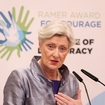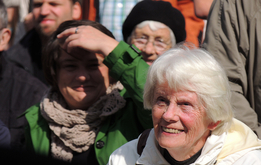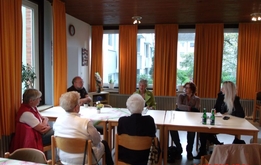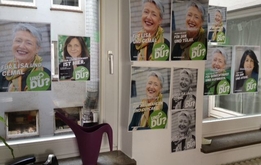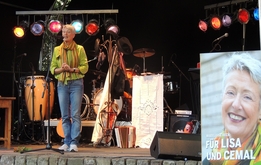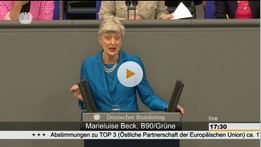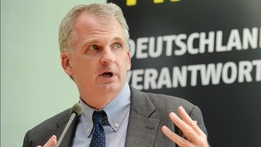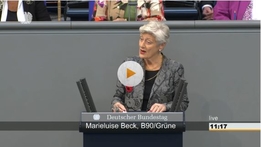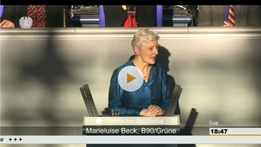Strengthening the rule of law in Russia
The Bundestag is requested to adopt the following motion:
I. The German Bundestag notes:
Russia , the EU’s largest eastern neighbour, is the focus of a special degree of attention from the German Bundestag. The German Bundestag considers the necessity and importance of close relations with Russia to be beyond question. The aim is a strategic partnership, based on the values of the Council of Europe, in solving global issues and cooperating in all fields of policy, economics, culture and research. These values include the rule of law.
President Dmitry Medvedev has been in office for around a year. In his first speech on the state of the nation before the Federal Assembly, in November 2008, he announced a sweeping and ambitious programme of domestic reforms. His criticism was directed primarily at the bureaucracy, which he described as hindering a fundamental transformation of state and society. He argued that it massively restricted individual freedom and autonomous action, and in this way hindered Russia ’s capacity for innovation and development. Medvedev therefore announced a campaign against corruption and “legal nihilism”. He declared reform of the Russian judiciary and the public administration in general, together with enforcement of the principles of the rule of law, to be his main political goals.
In spring 2008, Germany put forward a comprehensive foreign-policy proposal for a partnership for Russian modernisation. The strategy focuses in particular on the strengthening of the rule of law, administrative reform, support for economic development and wide-ranging education initiatives.
Progress in the field of the rule of law has been uneven. One important signal came in January 2009 when the decision was taken to revise the bill on treason, which had been drafted by the cabinet under Prime Minister Vladimir Putin and had sparked sharp criticism from human rights organisations regarding the restrictions it placed on the right to freedom of opinion. Equally important are the reviews President Medvedev has launched of the criminal laws against espionage and of media legislation.
On the proposal of President Medvedev, human rights ombudsman Vladimir Lukin was re-elected; the Presidential Council for Promotion of Civil Society Institutions and Human Rights, chaired by Ella Pamfilova, has been re-established. At a first meeting with the Council in April, the Russian President agreed to launch a review of the restrictive law on NGOs, which has been the subject of strong international criticism. In the same week, he gave his first lengthy exclusive interview to the Novaya Gazeta, a newspaper critical of the Kremlin.
Despite this progress, there continue to be worrying developments, in particular as regards the curtailment of trial by jury in favour of trial by judges alone and the amendment of criminal law to increase the penalties for certain offences relating to acts of terrorism. The German Bundestag notes that President Medvedev has called for the amendment to be revised in order to prevent interference with important rights under the European Convention on Human Rights.
It is also hard to avoid the impression that, in the case of several criminal trials, political influence is being exerted on the public prosecution office or the courts. The best known example, though not the only one, is the case of Mikhail Khodorkovsky, the former chief executive and principal shareholder of the energy company Yukos.
A report submitted to the Council of Europe, and the subsequently adopted Resolution 1418 (2005), already identified serious violations of the Russian Criminal Procedural Code and the right to a fair trial, as protected by Article 6 of the European Convention on Human Rights, during the first prosecution of Mikhail Khodorkovsky and his business partner Platon Lebedev from 2003 to 2005. These violations included a failure to respect the rights of the defence and the principle of equality before the law. The Parliamentary Assembly of the Council of Europe concluded that the state was not primarily engaged in the pursuit of criminal justice, but was seeking to weaken a political opponent and gain control of economic assets.
The German Bundestag notes with concern that a new trial has been launched against Mikhail Khodorkovsky and Platon Lebedev, both of whom are already serving long prison sentences. Both risk being sentenced to an additional 22 years in prison as a result of the current trial. Unlike the first trial, the proceedings are taking place in public. They are a test case for the credibility of the Russian judiciary, as called for by President Medvedev, and for compliance with the standards of the Council of Europe. There is concern that in this case, too, legal proceedings are being used for political ends. By taking such an approach, those responsible not only damage Russia’s reputation, its economy and its relations with other countries, but also the principles of the rule of law and human rights to which Russia has committed itself. Bearing in mind the principle of judicial independence called for by the German Bundestag, it is necessary to take the course of the trial and the Russian court’s decision into account in evaluating the proceedings.
Germany has a major interest in the success of the domestic reforms in Russia . An important contribution can be made, in particular as regards the rule of law, by offering an ambitious partnership and a critical dialogue between the Russian Federation and the EU. The EU and Germany have a special duty in this context, as European neighbours with a long, shared history with Russia .
II. The Bundestag calls on the Federal Government
- to support, within the framework of the European Union, observation of the trial of Khodorkovsky and Lebedev which enables an evaluation of the proceedings, about which the German Bundestag must be informed at regular intervals;
- to specifically address Russian deficiencies regarding the rule of law – including the example of the proceedings against Khodorkovsky and Lebedev – and to draw the Russian government’s attention to the obligations arising from membership of the Council of Europe and the OSCE;
- to support the Russian president in his efforts to create a truly independent judiciary;
- to agree, within the framework of the new partnership and cooperation agreement to be negotiated by the EU, on intensive cooperation regarding the judicial system with the aim of making a measurable contribution to enhancing legal certainty in Russia;
- to encourage more strongly, within the framework of the EU, the financing of measures which contribute to reform of the public administration, to the fight against corruption, and to the modernisation of Russia ’s economy and education system;
- to contribute to the financing of projects relating to the rule of law which are organised by the Council of Europe, the OSCE and NGOs and carried out in cooperation with the Russian government.
Volker Kauder, Dr Peter Ramsauer and parliamentary group
Dr Peter Struck and parliamentary group
Dr Guido Westerwelle and parliamentary group
Renate Künast, Fritz Kuhn and parliamentary group

